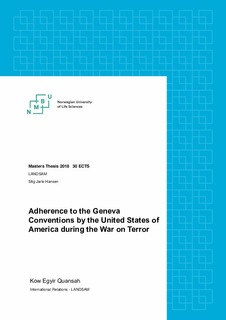| dc.description.abstract | Between 2001 and 2009 the United States was engaged in a War on Terror. This was a result of the terror attacks on USA mainland on September 11, 2001. As the war progressed, it became known through various reports and findings that the USA was disregarding some provisions in the Geneva Conventions with regards to its treatment of captured suspected terrorists. The USA however disagreed that it had disregarded any rules. President Bush posited that the USA had acted within the laws, and where it came under serious challenges about flouting these international laws, it questioned the meaning of these laws and the ambiguous form in which these laws were presented, subject to different interpretations. Even though several actors in the international community concluded that the USA had flouted some provisions of the Geneva Conventions the USA viewed its application of these laws differently. This study provides alternative ways of viewing the issue of adherence to international laws which has mostly been binary, i.e., states either adhere to or flout international laws. It provides a trend analysis of the different ways in which the USA reacted to the provisions of the Geneva Conventions during the War on Terror by analysing the speeches of President Bush. Critical realists view international laws as a moving target which are subject to reinterpretation. They stray from the conventional views of international laws as objective and apolitical. They posit that political, social and moral considerations embedded in the decision-making stage in the formulation of international laws makes them instruments of rule for dominant actors. Dominant actors therefore do not view the law as it is, but as it should be.
The art of war is either a breach of international law or an enforcement of same. In addition to the justification of protecting USA citizens from further attacks, President Bush mentioned the enforcement of international laws as justification for the war. This study analyses the use of the War on Terror to enforce international laws and concludes that even though the USA sometimes stated enforcement as justification, the war was in breach of some of the international laws the USA wanted enforced. | nb_NO |

